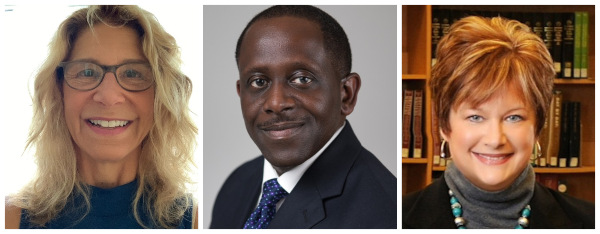The Future of Digital Equity | ALA Midwinter 2021
Cindy Altick Aden, Leon A. Wilson, and Gina J. Millsap share wisdom on how librarians can become stronger advocates for their community, and better understand issues facing patrons in need.
 |
From L: Cindy Altick Aden; Leon A. Wilson, Gina J. Millsap |
On Sunday, Jan. 24, during the American Library Association (ALA) Virtual Midwinter Meeting, over 1,000 eager attendees listened along as a panel of experts spoke about digital equity, or ensuring individuals and communities have the technological capabilities to fully participate in society.
Moderated by Julie Walker, State Librarian, Georgia Public Library Service, the panel began with insight from Cindy Altick Aden, Professor of Practice and Distinguished Practitioner in Residence at the iSchool, University of Washington, who explained that, as trusted institutions, libraries have a significant role to play in this arena. Aden highlighted how COVID-19 has made social inequity, racial injustice, and economic inequality impossible to ignore. "We are in a great position to advocate for our communities and understand issues that are facing them."
She continued by addressing the common practice of using library parking lots as Wi-Fi hotspots, and asked attendees to become fully aware of digital inequity in their area. She also covered other issues of digital equity including the increase in misinformation, and how easily it can spread in an increasingly technological world, as well as broadband legislation implemented by the FCC. "These issues require advocacy and education, and that's something that librarians can do for ourselves and for our communities."
Picking up the conversation, Leon A. Wilson, Chief of Digital Innovation & Chief Information Officer, The Cleveland Foundation, explained how libraries have long been involved in this work, emphasizing that the profession should focused on ensuring that no resident is left behind. Gina J. Millsap, who retired as Chief Executive Officer from Topeka and Shawnee County Public Library (KS), echoed that sentiment, noting that providing services that require people to make trips to the library doesn't work in a pandemic.
Millsap continued, "All those good-hearted tactics that we've been using as stopgaps—buying and circulating hotspots, sending bookmobiles as hotspots—while they help a little bit, they don't really scale. They're short-term solutions for our patrons, but they also give a pass to community leadership that should be owning the problem right along with us. Because, at the end of the day, this is not really a technology issue; this is a social equity issue."
Similar to Aden, Millsap stressed that libraries should be ready to address all kinds of equity. "Look at who gets service and what type of service they get. Not all service is equal."
To conclude, Aden, Wilson, and Millsap reminded attendees to always be open to continuous learning, both about issues surrounding digital equity and about their community at large.
RELATED
ALREADY A SUBSCRIBER? LOG IN
We are currently offering this content for free. Sign up now to activate your personal profile, where you can save articles for future viewing









Add Comment :-
Comment Policy:
Comment should not be empty !!!
KIVA RENEE
Wow, what a meaningful exchange. Is the recording available "On Demand". I'd like to watch it.
Thank you
Posted : Feb 14, 2021 01:39